
“I feel like I don’t need to shout the loudest any more,” says Emma Hayes. On Sunday, Hayes celebrates 10 years at Chelsea, and the manager has had to do a lot of shouting to push the development of the women’s game and grow her own team.
When Hayes walked into the club’s Cobham training ground for the first time she was on her own. “We’re talking about 10am on Sunday, no one on site,” she says. “‘What do you mean we don’t have an office? What do you mean there’s no full-time players or staff?’ There wasn’t a single member of staff that worked for the women’s section, let alone had an office, let alone had a desk or a filing cabinet. The starting point was zero, and that was terrifying and exciting all at once.”
All that was there was a single chair. Now the women’s side boast five Women’s Super League titles, four FA Cups, two League Cups and some of the best players in the world, including four newly crowned European champions. They also have an entire building at the back of the training ground, which was gradually taken over by Hayes’s expanding football empire. Her first decade at Chelsea will be celebrated against West Ham at Stamford Bridge on 11 September, in their opening game of the WSL season, alongside 30 years of the women’s team.
The 45-year-old has used her voice to grow the game more than most. Now more and more people are picking up the megaphone, too. Players are moving beyond a culture of gratitude and recognising they have the power to inspire change. The Lionesses writing to Liz Truss and Rishi Sunak to demand greater access for girls to sports in school is one example of that.
“I don’t think I’ve ever struggled with that,” Hayes says about speaking out. “But I do feel lonely at times being the voice in this country. Sometimes I wanted more from my colleagues in the game, I wanted them to shout as loud as I did. That was happening in private, but I felt like I put my head above the parapet. Whether it was to create minimum standards, demand more for officials or professionalise the game, I figured: ‘You’ve just got to do it. That’s a sacrifice you’ve got to make.’ And I know that sometimes you have to do that as a leader. I didn’t always want to, and sometimes I felt like [she exhales wearily]: ‘It’s always got to be me.’”
Advocating for her players, for women’s football, for women, has meant Hayes has been labelled as outspoken, opinionated and loud. “All of a sudden, as I’ve got an opinion to improve something for women, I get called outspoken,” she says. “Come on, I just want to make it better for everyone.
“I’m someone who’s felt that women should be paid what they’re worth. People say: ‘You have a big budget, you spend money’ – why shouldn’t I try and get the most [for] women I represent? I don’t feel ashamed of that. I wish everybody would have that mentality instead of a fear mentality, that we’re always going to face expulsion or fold as a club. I know all those things have happened as part of the game, but I’ve always wanted to go strive for something bigger.
“Many times I’ve had to sacrifice myself and just push. Even if I was like: ‘I’m going to get punched,’ at the same time. It’s been lonely doing that for such a long time. However, I look across us now, the Lionesses, everybody else, the coaches across the game, and I feel like I don’t need to shout the loudest any more.”
Picking the battles for her and the women’s side’s general manager, Paul Green, isn’t easy. “It’s so crucial to have good sounding boards and I have that,” says Hayes. “Paul and I sit side by side. I don’t know how many offices where the general manager and the head coach sit in the same office. We’ve sat in the same office for 10 years for this reason – we’re sounding out all the time what’s worth pushing and what’s not worth it.
“What I will say is every time there has been a sense from the team, and that includes everyone in it, where there’s any injustice or we wanted a little bit more, if it was absolutely clear we had to do something, we would do it.
“I haven’t felt hamstrung. Of course, everybody always wants more, but my glass is half-full. I’m happy. I have got great people, great staff, working here. Our staff and player retention is exceptional because culture is the thing that matters the most to us, and we’ve cultivated that over time because, Paul and I always say this, we spend money here like it’s our own. Because of that we value what we do with absolutely everything.
“But we listen. We listen as well as push when it’s time. The players will tell me when they really, really need something and I will do my best for them.”
What’s the next step? “The league leaving the FA and going to the Premier League or an independent body,” says Hayes. “And that there is a vision around the women’s game so we don’t just have single big moments – single events once every two years or once a year – [but] that they’re every week.
“We need the expertise coming into the game. For me that is hands down the next step and I’ve been really vocal about it. It’s not the FA’s responsibility, they don’t run leagues. It’s not their job to do that, they’re there for the national team.”












